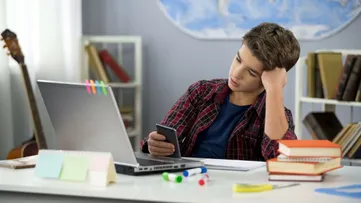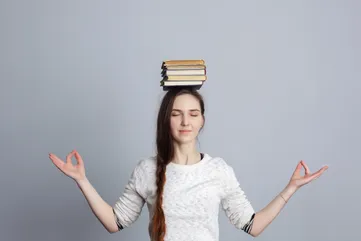Inattentive Type ADHD
Inattentive type ADHD causes persistent difficulties with focus, organization, and detail management without obvious hyperactivity, making teens appear spacey or lazy when they're actually struggling.
You're not alone
If your teen seems intelligent but spacey, loses everything, and can't stay organized despite trying, consider inattentive ADHD. This type is underdiagnosed, especially in girls who are socialized to be quiet. Many adults discover they have inattentive ADHD only after their child's diagnosis opens their eyes.
What it looks like day to day
Student
Your teen sits quietly in class, looks attentive, but realizes 20 minutes later they absorbed nothing and have no idea what was discussed.
Parent
You repeat instructions three times, watch your teen nod, then five minutes later they ask what they're supposed to do.
Tiny steps to try
Support focus and organization with targeted strategies.
- 1
External brain systems
Everything important goes in phone reminders or physical lists. Memory is unreliable.
- 2
Body doubling
Work alongside your teen. Physical presence helps maintain focus without interaction.
- 3
Chunk and timer
Break tasks into 15-minute segments with timers. Short bursts prevent drift.
- 4
Designated spots
Everything has ONE home. Keys, backpack, homework always go same place.
- 5
Record important info
Voice memos for instructions, photo of board assignments. Backup for attention lapses.
Why inattentive type goes unrecognized
Without disruptive hyperactivity, inattentive symptoms get misread as personality traits rather than neurological differences.
Inattentive symptoms:
• Daydreaming during class or conversations
• Losing everything constantly
• Starting tasks but not finishing
• Missing details despite trying
• Appearing to not listen when spoken to
• Avoiding tasks requiring sustained focus
These quiet struggles often lead to years of academic underperformance before anyone recognizes ADHD.
Ready to help your teen thrive?
Get personalized 1-on-1 coaching to build better habits and boost grades. Join 10,000+ families who trust Coachbit.
Frequently Asked Questions
Could this just be normal teen behavior?
Everyone loses focus sometimes, but inattentive ADHD involves persistent patterns across multiple settings that significantly impact functioning. If strategies that work for others consistently fail for your teen, and problems persist despite consequences, consider evaluation.
Why wasn't this caught earlier?
Inattentive type often flies under radar because these kids aren't disruptive. They may compensate through intelligence or parent support in elementary school. Problems become obvious when academic demands increase in middle and high school, requiring more independent organization and sustained focus.
Related Terms
ADHD (Attention-Deficit/Hyperactivity Disorder)
ADHD is a neurodevelopmental condition where the brain's executive function system works differently, affecting focus, impulse control, and activity levels in about 5-10% of children.
Combined Type ADHD
Combined type ADHD includes significant symptoms of both inattention and hyperactivity-impulsivity, the most commonly diagnosed ADHD presentation.
Executive Dysfunction
Executive dysfunction is when the brain's management system struggles to plan, focus, remember instructions, and juggle tasks, affecting daily functioning.
Hyperactive-Impulsive Type ADHD
Hyperactive-impulsive type ADHD primarily involves excessive physical movement and acting without thinking, with less prominent attention difficulties.
Working Memory
Working memory is your teen's mental sticky note that holds information just long enough to use it, like remembering instructions while doing homework or keeping track of their place in a conversation.
Related Articles

3 Tips to Help Your Child Focus on Homework
Kids struggle to focus and are easily distracted because their brains are undergoing rapid development. There are effective tools to improve concentration and focus in kids.
Read article
Balance Exercises: An Alternative Treatment for ADHD
A breakthrough in neuroscience shows that easy balance training exercises done at home can improve brain functioning as an alternative treatment for ADHD.
Read article
